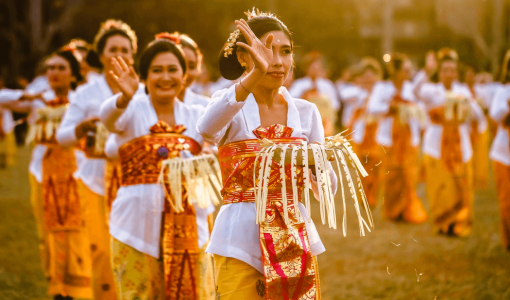Attention, Bali travellers! New crackdown on unruly behaviour means you'll receive a 'Dos and Don'ts' card on arrival
- Replies 6
While many of our SDC members might fondly remember their travelling adventures to hotspots like Bali, where the sun, sand and surf seemed to offer endless wonderful memories, it's the sad reality that some travellers today are giving international tourists a bad name.
Bali authorities have had enough of disrespectful visitors and are taking action by introducing a 'dos and don'ts' card to be distributed upon arrival for incoming tourists.
The move comes as a response to a string of incidents involving foreign tourists behaving inappropriately, disrupting local customs and culture, or breaching visa conditions. In fact, more than 130 deportations took place in just the first five months of this year.
Bali's Governor, Wayan Koster, has now signed off on 12 'dos' and eight 'don'ts' for international tourists in a circular distributed to government departments on the island.

Such undignified acts, including nudity at holy sites, have been a recurring theme, with two Russian bloggers deported in recent months—one for posing nude on a sacred tree and the other for baring it all at a holy volcano.
Last week, a video went viral of a naked German woman causing chaos during a traditional dance performance at a temple.
Now, for the first time, climbing holy trees or posing naked at culturally significant sites will be explicitly prohibited under these new guidelines, which will apply island-wide. The governor stated that the objective of the rules is to restore 'quality and dignity' to Bali's tourism sector, a sector that is still recovering after being completely shut down during the COVID-19 pandemic.
The 'don't list' for tourists includes: entering holy sites for non-prayer reasons, disrespectful behaviour at temples, and going nude or wearing immodest clothing.
Even aggressive conduct or using offensive language towards police and other government workers is prohibited. This comes partially as a response to a viral video circulated in March, which featured an Australian woman yelling at several police officers who pulled her over for riding a scooter without a helmet.
The 'dos list', on the other hand, emphasises following local customs and cultural norms in Bali, such as not using cryptocurrencies for transactions while in Indonesia or illegally running businesses that violate visa conditions. Tourists are also advised to rent scooters and employ licensed tour guide services.
Chair of the Bali Hotel and Restaurant Association, Rai Suryawijaya, told ABC that the influx of people seeking refuge in Bali due to the Russia-Ukraine war had raised concerns over their intentions and potentially illegal activities, as many of these individuals are running out of money after a prolonged stay.
The 'dos and don'ts' list, which has been widely acknowledged as accurate and in line with local cultural norms, signals a move towards tighter enforcement by various Bali agencies. Starting in June, the rules will be printed and provided to all arrivals at the island's airport.
Before the pandemic, Bali thrived on international tourism, attracting around 18,000 visitors daily. Sadly, even over a year after reopening its borders, the island is yet to bounce back to pre-pandemic levels, with only 13,000 to 15,000 tourists per day.
While the economy is slowly improving, Mr Suryawijaya says, 'It's not normal yet, so we still have to work hard to improve it.'

If you're planning a trip to Bali anytime soon, don't forget to keep this article in mind along with the card you'll receive upon arrival. It's important to stay alert and stick to their guidelines to ensure a trip filled with unexpected delights, thrilling adventures, and amazing experiences.
Let's make sure we all play by the rules and make the most of our holiday by respecting the local laws and customs at all times!
Wishing you all fantastic travels and a great time, folks!
Bali authorities have had enough of disrespectful visitors and are taking action by introducing a 'dos and don'ts' card to be distributed upon arrival for incoming tourists.
The move comes as a response to a string of incidents involving foreign tourists behaving inappropriately, disrupting local customs and culture, or breaching visa conditions. In fact, more than 130 deportations took place in just the first five months of this year.
Bali's Governor, Wayan Koster, has now signed off on 12 'dos' and eight 'don'ts' for international tourists in a circular distributed to government departments on the island.

The Indonesian Government is attempting to crack down on unruly tourists by handing out cards with 'dos' and 'don'ts' rules to anyone passing through Bali's airport. Credit: Pixabay/innokurnia.
Such undignified acts, including nudity at holy sites, have been a recurring theme, with two Russian bloggers deported in recent months—one for posing nude on a sacred tree and the other for baring it all at a holy volcano.
Last week, a video went viral of a naked German woman causing chaos during a traditional dance performance at a temple.
Now, for the first time, climbing holy trees or posing naked at culturally significant sites will be explicitly prohibited under these new guidelines, which will apply island-wide. The governor stated that the objective of the rules is to restore 'quality and dignity' to Bali's tourism sector, a sector that is still recovering after being completely shut down during the COVID-19 pandemic.
The 'don't list' for tourists includes: entering holy sites for non-prayer reasons, disrespectful behaviour at temples, and going nude or wearing immodest clothing.
Even aggressive conduct or using offensive language towards police and other government workers is prohibited. This comes partially as a response to a viral video circulated in March, which featured an Australian woman yelling at several police officers who pulled her over for riding a scooter without a helmet.
The 'dos list', on the other hand, emphasises following local customs and cultural norms in Bali, such as not using cryptocurrencies for transactions while in Indonesia or illegally running businesses that violate visa conditions. Tourists are also advised to rent scooters and employ licensed tour guide services.
Chair of the Bali Hotel and Restaurant Association, Rai Suryawijaya, told ABC that the influx of people seeking refuge in Bali due to the Russia-Ukraine war had raised concerns over their intentions and potentially illegal activities, as many of these individuals are running out of money after a prolonged stay.
The 'dos and don'ts' list, which has been widely acknowledged as accurate and in line with local cultural norms, signals a move towards tighter enforcement by various Bali agencies. Starting in June, the rules will be printed and provided to all arrivals at the island's airport.
Before the pandemic, Bali thrived on international tourism, attracting around 18,000 visitors daily. Sadly, even over a year after reopening its borders, the island is yet to bounce back to pre-pandemic levels, with only 13,000 to 15,000 tourists per day.
While the economy is slowly improving, Mr Suryawijaya says, 'It's not normal yet, so we still have to work hard to improve it.'
Key Takeaways
- Authorities in Bali will distribute a list of 'dos and don'ts' for visitors arriving at the tourist island, warning they will cancel visas due to a wave of disrespectful tourists and visa breaches.
- In a circular issued for government departments, Governor Wayan Koster signed off on 12 'dos' and eight 'don'ts' for international tourists following incidents such as nudity at holy sites and disrespectful behaviour at temples.
- The governor says the rules aim to restore 'quality and dignity' to Bali's tourism sector, which is still recovering after shutting down during the COVID-19 pandemic.
- The guidelines largely align with existing laws and cultural norms in Bali, but their promotion is seen as an order to step up enforcement; the rules will be printed and given to all arrivals at the airport starting in June.
If you're planning a trip to Bali anytime soon, don't forget to keep this article in mind along with the card you'll receive upon arrival. It's important to stay alert and stick to their guidelines to ensure a trip filled with unexpected delights, thrilling adventures, and amazing experiences.
Let's make sure we all play by the rules and make the most of our holiday by respecting the local laws and customs at all times!
Wishing you all fantastic travels and a great time, folks!








